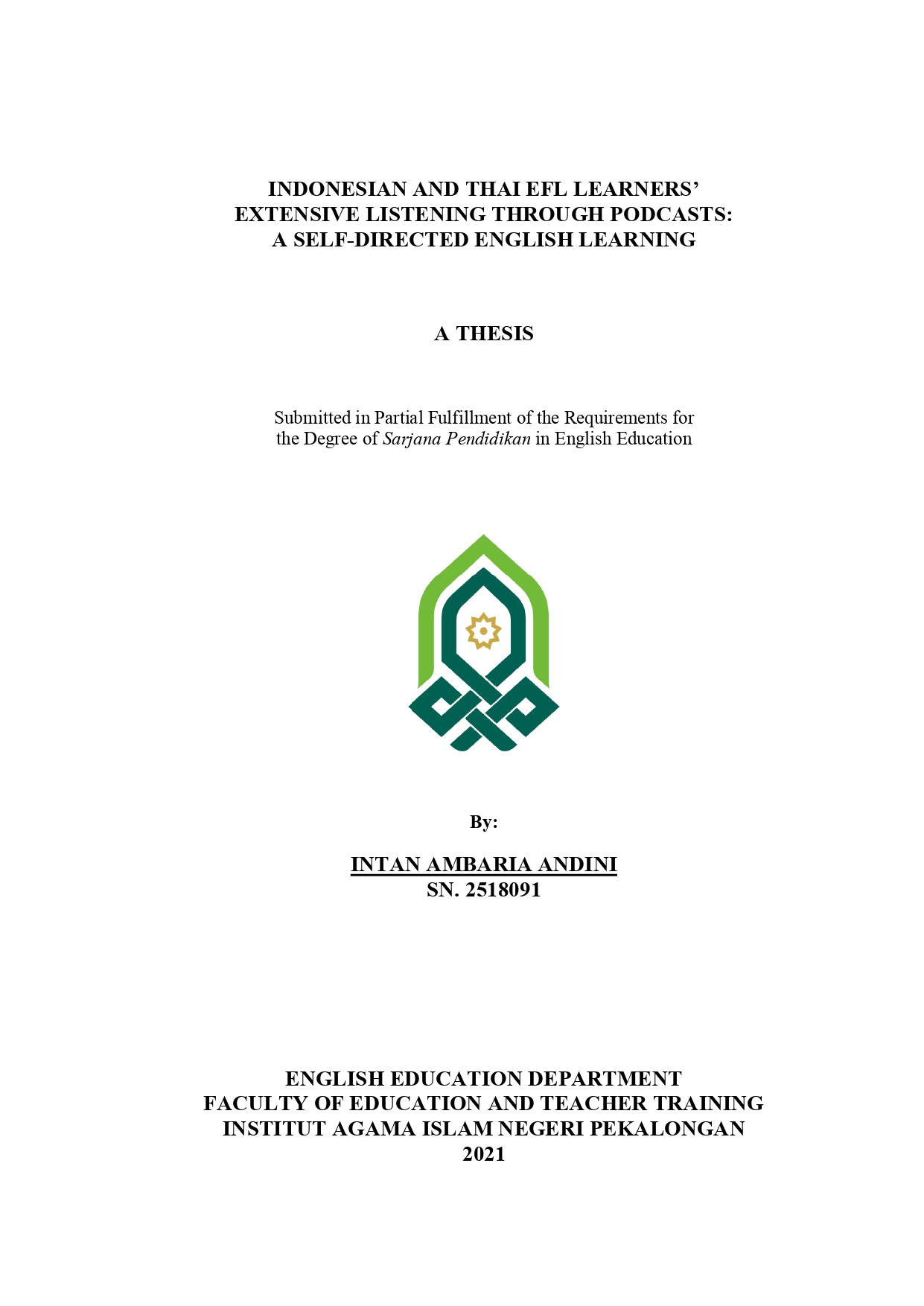
SKRIPSI TADRIS BAHASA INGGRIS
Indonesian And Thai EFL Learners' Extensive Listening Through Podcasts: A Self-Directed English Learning
Broader space for exploration emerges when language learners regulate
self-improvement activities in their leisure time. This paper attempts to present a
narrative study of two young adult EFL learners from Indonesia and Thailand,
who routinely schedule extensive listening through podcasts for their self-directed
English learning. Data for this study were collected using learners’ learning
diaries and interview. Furthermore, they were analyzed using thematic analysis.
The researcher argues that this study will provide empirical insights into
independent English learners’ lived experience as well as clarifying that learning
outside classroom is no less meaningful nor less enhancing than that of learning
in the classroom. The variety, multitasking, and flexibility of podcasts, as well as
personal preferences for auditory learning, opportunities to learn other things
besides English, and an unwavering future goal toward study and work
advancement, are some of the factors that motivated learners to engage in this
learning practice. Improvements in listening comprehension, pronunciation
abilities, and increased understanding of components of English linguistics were
discovered as a result of self-learning through podcast-based extensive listening.
Keywords: EFL learner, extensive listening, podcast, self-directed learning.
REFERENCES
Abdulrahman, T. R., Basalama, N., & Widodo, M. R. (2018). The impact of
podcasts on EFL students’ listening comprehension. International Journal of
English Linguistics, 8(6), 122.
Alm, A. (2013). Extensive listening 2.0 with foreign language podcasts.
Innovation in Language Learning and Teaching, 7(3), 266–280.
Alqahtani, Mofareh. (2015). The importance of vocabulary in language learning
and how to be taught. International Journal of Teaching and Education, Vol.
III(3), pp. 21-34.
Al-Fadda, H., & Al-Qasim, N. (2013). From Call to Mall: The effectiveness of
podcast on EFL higher education students’ listening comprehension. English
Language Teaching, 6(9), 30-41.
Bacon, S. M. (1989). Listening for real in the foreign-language classroom.
Foreign Language Annals, 22(6), 543–550.
Barkhuizen, G., Benson, P., & Chik, A. (2013). Narrative Inquiry in Language
Teaching and Learning Research. New York: Routledge.
Benson, P. (2011). ‘‘Language Teaching and Learning beyond the Classroom: An
Introduction to the Field’’. In Beyond the Language Classroom, edited by P.
Benson and H. Reinders, 70-16. Basingstoke: Palgrave Macmillan.
Benson, P. (2011a). Teaching and Researching Autonomy in Language Learning.
Second edition. London: Longman.
Brown, H. D. (2007). Teaching by principles: An interactive approach to
language pedagogy (3rd ed.). New York: Pearson Longman.
Camelia, R. D. A., Aditya, M. Y., & Ridwan A. (2021) Podcasts: improving
students’ extensive listening skills. English Teaching Journal: A Journal of
English Literature, Language and Education, 9(1), 2021, 54-59.
Chang, A.C. (2016). Teaching L2 Listening: In and Outside the Classroom. In W.
A. Renandya, H.P. Widodo (eds.), English Language Teaching Today: Linking
Theory and Practice (pp. 111-125). Basel, Switzerland: Springer International
Publishing AG.
Connelly, F. M., & Clandinin, D. J. (1990). Stories of experience and narrative
inquiry. Educational Researcher, 19(5), 2-14.
Ketersediaan
| 23SK2325046.00 | SK TI 23.046 INT i | My Library (Lantai 3. Local Content) | Tersedia |
Informasi Detail
- Judul Seri
-
-
- No. Panggil
-
SK TI 23.046 INT i
- Penerbit
- Pekalongan : Jurusan S-1 Tadris Bahasa Inggris FTIK UIN K.H. Abdurrahman Wahid Pekalongan., 2022
- Deskripsi Fisik
-
xvi, 39 hlm., 30 cm; Bibliografi: 40-43
- Bahasa
-
Inggris
- ISBN/ISSN
-
-
- Klasifikasi
-
371. 394
- Tipe Isi
-
-
- Tipe Media
-
-
- Tipe Pembawa
-
-
- Edisi
-
-
- Subjek
- Info Detail Spesifik
-
-
- Pernyataan Tanggungjawab
-
Intan Ambaria Andini (2518091)
Versi lain/terkait
Tidak tersedia versi lain
Lampiran Berkas
Komentar
Anda harus login sebelum memberikan komentar
 Karya Umum
Karya Umum  Filsafat
Filsafat  Agama
Agama  Ilmu-ilmu Sosial
Ilmu-ilmu Sosial  Bahasa
Bahasa  Ilmu-ilmu Murni
Ilmu-ilmu Murni  Ilmu-ilmu Terapan
Ilmu-ilmu Terapan  Kesenian, Hiburan, dan Olahraga
Kesenian, Hiburan, dan Olahraga  Kesusastraan
Kesusastraan  Geografi dan Sejarah
Geografi dan Sejarah